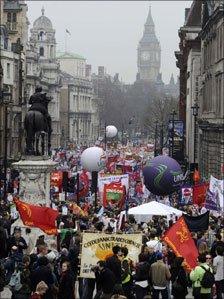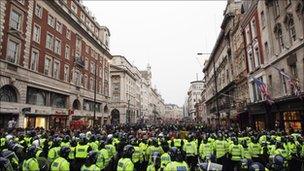Anti-cuts march: Tens of thousands at London protest
- Published
Watch: The BBC's Sophie Long spoke to some people taking part in the march
More than 250,000 people have attended a march and rally in central London against public spending cuts.
Labour leader Ed Miliband addressed crowds in Hyde Park and the main march organised by the Trades Union Congress passed off peacefully.
But small groups attacked shops and banks with a stand-off in Piccadilly. There have been 214 arrests and 66 people injured, including 13 police.
Ministers say the cuts are necessary to get the public finances in order.
In the largest public protest since the Iraq war rally in 2003, marchers from across the UK set off from Victoria Embankment to Hyde Park, where TUC general secretary Brendan Barber was first in a line of speakers.
"We are here to send a message to the government that we are strong and united," he said.
"We will fight the savage cuts and we will not let them destroy peoples' services, jobs and lives."
Mr Barber was followed by Mr Miliband, who said: "The Tories said I should not come and speak today. But I am proud to stand with you. There is an alternative."
The march began at 1200 GMT and it took more than four hours for the protesters to file past the Houses of Parliament on their way to the park.
The TUC, which organised the event, said more than 250,000 people had taken part, and the Metropolitan Police confirmed the numbers.
BBC political reporter Brian Wheeler, in central London, said there were lots of families and older people, and the atmosphere was good-natured but the anger was real.
"The noise in Whitehall was deafening as thousands of protesters banged drums, blew whistles and shouted anti-cut slogans, slowly making their way towards Trafalgar Square.
"The crowds were booing as they went past Number 10, but the demonstration was good-natured and friendly.
"There are hundreds of trade union banners, but we have also spoken to public sector workers who have come to make their voices heard."
One of those protesting was Peter Keats, 54, from Lowestoft, Suffolk, who works for Jobcentre Plus.

Organisers estimated at least 250,000 people attended
He said: "Personally, I think it's wrong the way we are hitting the poor.
"I'm not so much worried about myself but the customers I deal with are vulnerable and I'm worried about them and I'm worried about the kids of this country."
Demonstrator Christine Nugent, a university research fellow, said: "The size and scale of it, and the range of people here, is great."
The veteran of anti-Margaret Thatcher demonstrations in the 1980s said protesters came from all walks of life, adding: "There are a lot of trade unionists here, but it's not just the usual suspects."
There have been separate incidents involving a number of protesters, some with their faces covered by scarves, away from the main march:
A sit-in organised by the campaign group UK Uncut took place at Fortnum & Mason department store in Piccadilly. The group has previously mounted protests against tax avoidance measures by big businesses
A bonfire was lit by protesters at Oxford Circus, where earlier police said light bulbs containing ammonia were thrown at officers
Topshop on Oxford Street had its windows smashed and was doused with paint
Missiles were thrown at the Ritz Hotel, Piccadilly
Bank branches including the Royal Bank of Scotland were attacked with paint and had windows broken, while branches of HSBC and Santander were broken into.
Scotland Yard said there had been 202 arrests for public order offences, criminal damage, aggravated trespass and violent disorder.
Commander Bob Broadhurst said: "The main TUC march has been going well. We have had more than a quarter of a million people with hardly any problems.
"Unfortunately we have had a group of approximately 500 criminals committing some disorder including throwing paint at Topshop in Oxford Street and at the police, and scaring the public who are trying to shop."
Policing minister Nick Herbert said the government was "committed to supporting peaceful protest" and blamed the violence on "a small minority of individuals".

A stand-off between police and splinter groups took place in Piccadilly
Mr Miliband condemned the violence, saying: "There is no excuse for it. It is unlawful and wrong."
Civil rights group Liberty said the march had been "infiltrated by violent elements" who attacked buildings before "melting into the demonstration once more".
Earlier, the largest union involved, Unite, said so many of its members had wanted to take part that it could not find enough coaches or trains to ferry them to London.
Its general secretary Len McCluskey said the scale of the deficit had been exaggerated.
Outlining his economic plan to the BBC, he said: "Our alternative is to concentrate on economic growth through tax fairness so, for example, if the government was brave enough, it would tackle the tax avoidance that robs the British taxpayer of a minimum of £25bn a year."
Education Secretary Michael Gove said he could understand the disquiet and anger.
"But the difficulty that we have as the government inheriting a terrible economic mess is that we have to take steps to bring the public finances back into balance," he said.
Mr Miliband is attending the march but is yet to sketch out an alternative, he added.
The Cabinet Office Minister Francis Maude says Ed Miliband's claim of cuts harking back to the 1980s was 'absurd'
Matthew Sinclair, director of the Taxpayers' Alliance which lobbies for lower taxes and greater government efficiency, said: "It's understandable that people feel upset...
"But in the end it's not valid and what politicians should be doing is not encouraging this rally but saying look, you've got to be more realistic about the options facing this country."
- Published27 March 2011
- Published26 March 2011